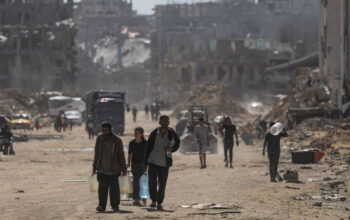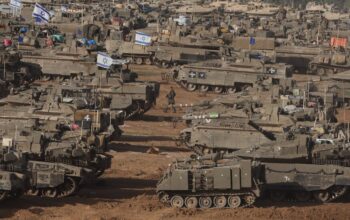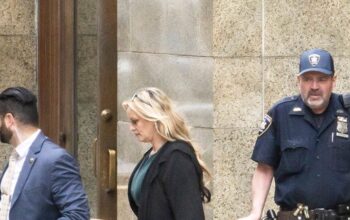
OUTSKIRTS OF BAKHMUT, Ukraine — Large snowflakes drifted silently through the trees as two Soviet-era tanks roared to life and churned through the mud up the hill. It was daybreak on one of the last days of winter, and the tank commander and his deputy tramped through the snow checking on the men as they readied for battle.
“The snow will give us cover,” said the commander, Poltava, explaining that Russian reconnaissance Orlan-10 drones that frequently fly over Ukrainian positions would be hampered by the weather. “We will bear it. The main thing is for our enemy to have a hard time and go home.”
Like other members of the Ukrainian military in this article, he insisted on being identified only by his code name.
Equipped with Soviet-era tanks and relying on decades-old training, Poltava, 51, and his deputy, Chancellor, 57, embody the resilience of the Ukrainian Army. Trained at Ukraine’s Kharkiv Tank Institute more than 30 years ago, they were plucked from the ranks of volunteers soon after Russia invaded Ukraine last year and sent to lead a tank company. They have been fighting ever since.
Their training has kept the men alive and their unit operational month after month. They even expanded their arsenal with a Russian T-72 tank captured in a battle in the northeastern city of Kharkiv, though they expressed frustration with the slow pace of deliveries of promised Western battle tanks that would enable them to take the battle to the Russians.
“We need Western equipment so that we can go out at night,” Chancellor said, “and good communication and good optics. Here, it’s all old.”
In a tough war of attrition, though, their personal history casts light on the broader strength of the Ukrainian resistance.
The two men graduated from the tank academy within a few years of each other — Chancellor in 1988 and Poltava in 1992. It was a tumultuous time, with the breakup of the Soviet Union and more than a dozen former Communists countries and Soviet republics gaining independence, and neither continued his military career for long.
Oleksandr Chubko contributed reporting.



